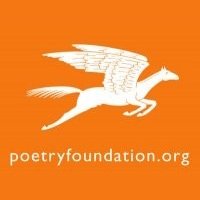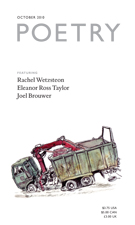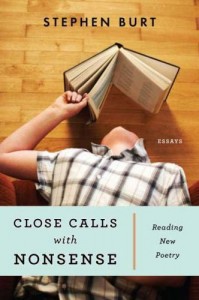Wednesday, November 24th, 2010

Talk about staying grounded!
Arian Foster, running-back for the Houston Texans, has made quite a name for himself in his first years in the NFL.
But that is not all he is known for- Foster is an avid poet, writer, and literary junkie. As this article says, Arian is “not just poetry in motion, but a poet in motion.” Also included in the article is a sample of some of Fosters’ work.
Don’t let the muscles fool you!
Posted in Uncategorized | 3 Comments »
Monday, November 15th, 2010
 This is not your run-of-the-mill open-mic event, nor is it your average poem for that matter; a ‘poetry slam’ is a bombastic way for writers and creators to verbally express themselves.
This is not your run-of-the-mill open-mic event, nor is it your average poem for that matter; a ‘poetry slam’ is a bombastic way for writers and creators to verbally express themselves.
Performances can be dark and creepy, comical and goofy, or rigorous and inspiring.
Taylor Mali, who is a full-blooded poet, has made a name for himself in this arena. If you didn’t know what a poetry slam was before this very sentence, you’re about to be schooled: Check out this video of Taylor slam dunkin’ his words on listeners and onlookers. And for the hell of it, here is one that he is known for. Enjoy!
Posted in Uncategorized | No Comments »
Wednesday, October 27th, 2010
 The Poetry Foundation’s website seemingly has it all: They broadcast poetry, they broadcast critiques of poetry, they run a poetry magazine, they feature video and audio of poets and artists, and they have interactive tools to allow for more convenient and user friendly access to poetry. The Poetry Foundation lives, breathes and yes, eats poetry!
The Poetry Foundation’s website seemingly has it all: They broadcast poetry, they broadcast critiques of poetry, they run a poetry magazine, they feature video and audio of poets and artists, and they have interactive tools to allow for more convenient and user friendly access to poetry. The Poetry Foundation lives, breathes and yes, eats poetry!
One of the leading literary foundations in the world, the Poetry Foundation was established in 2003, developing out of the Modern Poetry Association, which was founded in 1941. The non-profit organization is working to raise poetry awareness, so to speak. Poetry POWER! They aim to make the art form a more influential in American culture. The Poetry Foundation is leading the way in helping to re-frame the receptivity of poetry by creating new methods for availability and encouraging new kinds of poetry, poets, and readers.
The website generates news about poetry per day for dedicated readers. It also has more simple tools, such as the “find a poem,” where viewers can navigate their way to poems by searching by category. They also have a “poetry tool,” where viewers can limit their experience by occasion, poet, keywords, or titles. These features are perfect for students in school who are assigned a project on poetry or a specific poet.
Also online is Poetry Magazine, which was founded in Chicago by Harriet Monroe in 1912, and is published by the foundation. Online viewers can  access limited content of current and past issues before deciding to subscribe. There is also an opportunity for poets/writers to submit their work for possible publication. Another piece to the website is “Harriet: The Blog.” Harriet is a news blog on the website and provides online discussion about poetry.
access limited content of current and past issues before deciding to subscribe. There is also an opportunity for poets/writers to submit their work for possible publication. Another piece to the website is “Harriet: The Blog.” Harriet is a news blog on the website and provides online discussion about poetry.
If I could contribute to the Poetry Foundation’s website, I would pitch the following three concepts:
One: Implement an online video forum for poets and fans to connect. Perhaps, run a week out of the month where poets with new material come to talk about poetry and answer questions about their work via live chat. I think the poetry world is not only niche enough to have people be interested in something like this, but specific enough to foster a friendly and mature atmosphere for discussion.
 Two: I have this idea of a piece on the Marilyn Monroe book, “Fragments,” that was released this month. (onMason interstitial here) Though I am not completely sure how it would work, I want to do a slideshow of her most iconic pictures, and pair them with an excerpt from the book that corresponds chronologically to when each picture was taken. This would aim to demonstrate the contrast between her public image and her private-self.
Two: I have this idea of a piece on the Marilyn Monroe book, “Fragments,” that was released this month. (onMason interstitial here) Though I am not completely sure how it would work, I want to do a slideshow of her most iconic pictures, and pair them with an excerpt from the book that corresponds chronologically to when each picture was taken. This would aim to demonstrate the contrast between her public image and her private-self.
Three: I would like to see something on the website that dives into “How-to’s.” For example, how to critique a poem could possibly be featured in a section of the website. Or perhaps, how to write certain type of poem would be useful. I see this bringing traffic to the website and consequently, increasing the reputable image that it already has.
Posted in Uncategorized | 3 Comments »
Tuesday, October 19th, 2010

Based on a controversial 1956 poem by Allen Ginsberg, who is portrayed by James Franco, “Howl” premiered at the 2010 Sundance Film Festival, and is now on a tour across the US.
The film is being described as anything from “gutsy” to “inventive” to “stunning.”
If there is one indie film you are going to invest your time into this year, “Howl” should be in contention, if for nothing else than to see James Franco… talk about brilliant!
Posted in Uncategorized | 3 Comments »
Monday, September 27th, 2010
A well respected literary critic, Stephen Burt is particularly occupied with, and interested in, the poetic realm. Throughout his career, he has been published on various platforms (i.e., magazines, newspapers), and his work involves the criticism and creation of poetry.
 Burt boasts six books under his scholarly belt, his most recent being Close Calls with Nonsense: Reading New Poetry (2009), in which he summons both the inexperienced and the seasoned poetry reader to find poetry that matters to them. He says, “The poets I know don’t want to be famous people half so much as they want their best poems read; I want to help you find and read them. I write here for people who want to read more new poetry.” To some, poetry speaks a totally different language; a language that requires translation. This can be a turn-off, a load too heavy to carry. In Close Calls with Nonsense, Stephen Burt attempts to, and succeeds in, creating a remedy for the intimidation that poetry can so often present.
Burt boasts six books under his scholarly belt, his most recent being Close Calls with Nonsense: Reading New Poetry (2009), in which he summons both the inexperienced and the seasoned poetry reader to find poetry that matters to them. He says, “The poets I know don’t want to be famous people half so much as they want their best poems read; I want to help you find and read them. I write here for people who want to read more new poetry.” To some, poetry speaks a totally different language; a language that requires translation. This can be a turn-off, a load too heavy to carry. In Close Calls with Nonsense, Stephen Burt attempts to, and succeeds in, creating a remedy for the intimidation that poetry can so often present.
Also on Burt’s extensive literary resume is an assortment of essays and reviews for esteemed publications, including The Boston Review, The New York Times Book Review and the Poetry Society’s Poetry Review. One such review stands out among critics as being influential in the world of poetry: In a 1998 essay for The Boston Review, Burt introduces the term “elliptical poetry,” which has since been reinterpreted and expanded upon. To Burt, the label of “elliptical poetry” is largely a way to depict a poet, rather than a poem. It alludes to a poet with a manic frame of mind, and a slightly jumbled poetic vision. (Sounds like my cup of tea, actually). In short, and to simplify, “elliptical poets” are like the Jim Carey’s of film, or the Mariah Carey’s of music; over-the-top and frenzied, and most of the time, fabulous.
For all of this and more, Stephen Burt is a leading poet-critic, and is held in high esteem by others in his arena. To boot, he is a professor at Harvard University where he teaches English (not the language), and where he has recently received tenure. Check out his personal blog where he casually imparts his brilliance and provides insight into the sometimes scary, most times elliptic but the always beautiful world of poetry.
Posted in Uncategorized | 2 Comments »






